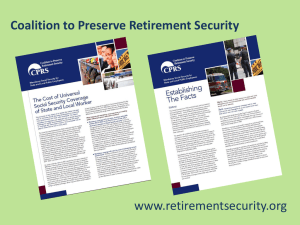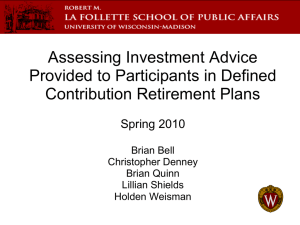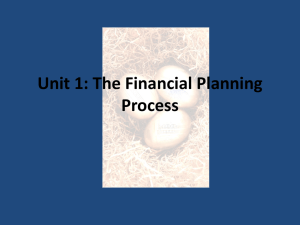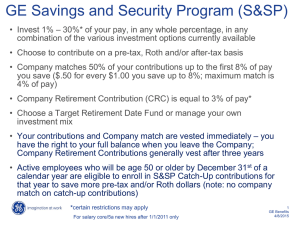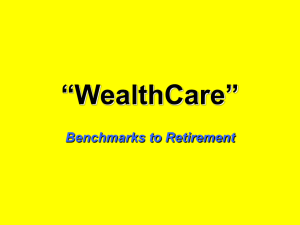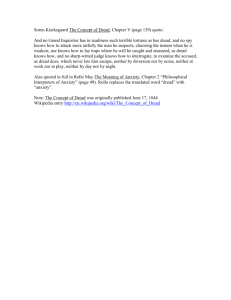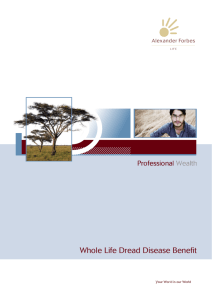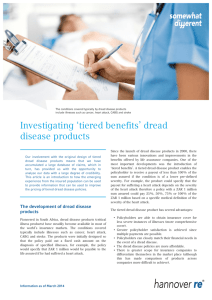Women are from Venus Powerpoint Presentation – English(28)
advertisement
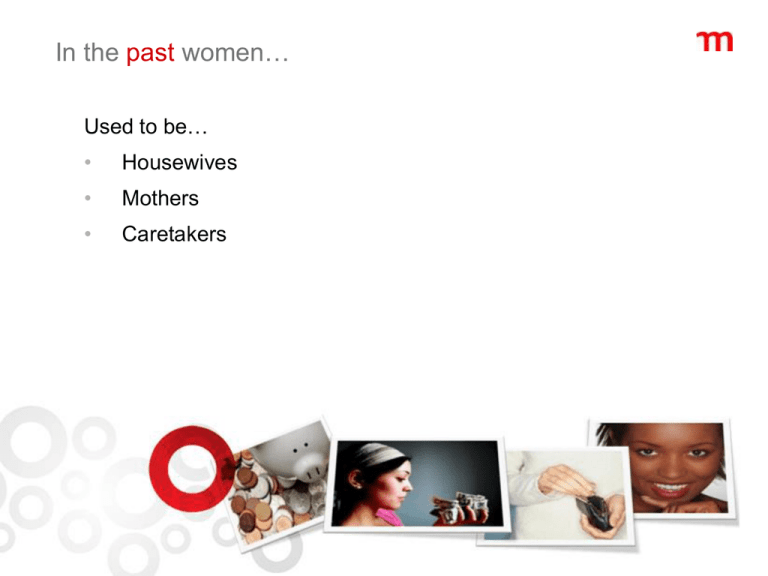
In the past women… Used to be… • Housewives • Mothers • Caretakers But today… Women equal to: • 52% of the SA population and make up .. • 39% of the workforce of which • 51% are in professional and technical positions • 68% are black professionals • 47% have all managerial, political, professional and executive positions And only… • 34% of retirement annuities… • 43% of life policies… • 38% of endowments/savings products… • 27% of funeral policies… • 17% of short-term cover… • 15% of medical insurance.. are owned by women Remember that… • Women live longer than men • 6% retire financially independent • Dual income families need two pensions • Women need to break career paths to raise children • Medical costs escalate specially at retirement • Inflation halves the buying power/value of your money every 8 years (rule 72: divide 72 by current inflation rate= every x year value of money halves) More sobering thoughts… Inflation Buying power of money is decreasing - Make provision 2002 2012 R13.95 R37.99 COKE CAN 6pack 2002 2012 R3.61 R12.22 PETROL/liter INCREASE INCREASE 172% 239% 2002 R58.95 2012 2002 2012 R144.95 R21.99 R63.99 CASTLE LAGER 24 RICOFFY 750g INCREASE INCREASE 146% 191% More sobering thoughts… Inflation Buying power of money is decreasing - Make provision 2002 2012 2002 2012 R26.99 R53.99 R5.59 R17.49 SKIP WASHING POWDER 2kg IWISA MAIZE MEAL INCREASE INCREASE 100% 213% 2002 2012 R4.75 R11.99 LAYS CHIPS 125g INCREASE 152% 2002 R4 800 2012 R14 100 HIGH SCHOOL FEES/year (GREY GOLLEGE BLOEMFONTEIN) INCREASE 194% More sobering thoughts… Inflation Buying power of money is decreasing - Make provision 2002 2012 R7 590 R15 000 *THREE-BEDROOM HOUSE DOUBLE GARAGE, SWIMMING POOL IN NEWLANDS CT (monthly rental) INCREASE 60% 2002 2012 R95 750 R158 900 FORDIKON INCREASE 66% The truth is… • 50% of marriages end in divorce • 50% of women over 65 are widowed or divorced • Women suffer dread diseases earlier and more frequently than ever before • Life policies are often ceded to creditors More sobering thoughts… • Most working people dream about a carefree retirement in the future. Reality is quite different for most who reach retirement • Research over a long period indicates that, out of every 100 South Africans who work, the situation at age 65 would probably be as follows: - 49 will be dependent on the state or family - 29 would have died - 12 will be bankrupt - 5 will still be working - 4 will be able to retire comfortably - 1 will be wealthy More sobering thoughts... • Salary cheques left Age 25 480 35 360 45 240 55 120 Historical Hysterical realities? • The “Cinderella” syndrome -“Someone will rescue me!” • The “It won’t happen to me” syndrome Have you ever pictured your life if… • Your husband dies, his business is in trouble and all the policies are ceded to the bank? • He is retrenched and his group life cover falls away? • He has no policies and is now uninsurable? • You’re divorced, he dies and you have to compete with his new family for maintenance? • You wanted a divorce but couldn’t afford an attorney? • If he retires earlier than expected? • If he dies without a will? Women are from Venus Surveys reveal • Men’s major fear in old age is loneliness • Women’s is poverty Getting started • Make the decision to take control • Find an intermediary you trust • Tackle debt • Prepare and stick to a budget What you are entitled to from your intermediary • Trust and mutual respect • Analysis of your financial status • Discussion of personal and financial goals • Written recommendations • Agreement on plan • Annual review You are not alone in the debt trap • South Africans are deep in debt • 130 000 people receive summonses every month for defaulting on debt • Nearly 12% of the workforce can expect to have debt judgments against them • The Reserve Bank puts household debt at 51% of household income Budgeting is a family affair Three steps • Where are we now? - What does your spouse/partner earn? - Gross earnings vs “Take home” pay • What are we going to change? • Discipline. Dedication. Control A balanced financial plan A balanced financial plan Protection Death Disability Creation of wealth Medical cover Dread disease Savings & Investment Retirement Employer Own Pension/ Provident Retirement annuity After tax savings A balanced financial plan A balanced financial plan Protection Death Disability Creation of wealth Medical cover Dread disease Savings & Investment Retirement Employer Own Pension/ Provident Retirement annuity After tax savings Protection • Death - Afford any debts and costs of untimely death • Disability - Ensure you can survive any loss of income • Medical cover - Hospital and doctors’ costs • Dread disease - Surviving dread disease Dread disease • Heart disease - 25% of women will suffer from cardiovascular disease before age 60 • Cancer - 1 in 7 women will develop cancer The good news is… • Heart disease - 80% of heart attack patients survive • Cancer - 50% are alive 5 years after diagnosis • Stroke - 1950: survival rate 11% - Today: 75% The cost of surviving • 1/3 = direct medical costs • 2/3 = indirect expenses including - Home or car modifications - Alternative medicines or treatments - Patient, spouse and caregiver’s loss of income - Rehabilitation e.g. Physio - Reconstruction and prosthetics A balanced financial plan A balanced financial plan Protection Death Disability Creation of wealth Medical cover Dread disease Savings & Investment Retirement Employer Own Pension/ Provident Retirement annuity After tax savings Savings and investments • Emergency fund • “Celebration of Life” fund • Education fund • Long-term growth fund Cost of delay Regular contribution R500 pm – starting at different ages, will grow to age 65, assuming a 10% pa net investment return 5,000,000 4,500,000 4,000,000 3,500,000 3,000,000 2,500,000 2,000,000 1,500,000 1,000,000 500,000 0 Retirement savings - the cost of delay 20 25 30 35 40 45 50 55 60 65 Starting age Money at the end • “Having money left at the end of your life is no problem, having life left at the end of your money is.” - Samuel Baldwin Imagine if… • • • • • • You had your own policies on his life You had your own disability cover You had your own dread disease cover You contribute to a retirement fund and supplement any shortfall You had a nest egg for education You had an emergency fund The rest of your life • “Take care of the future. It is where you will spend the rest of your life.” - Charles Kettering


